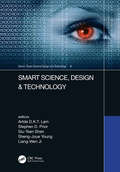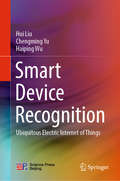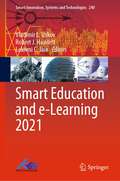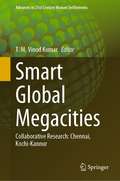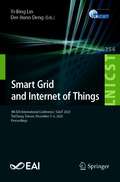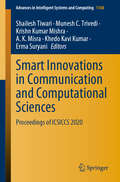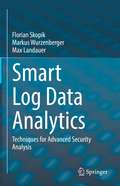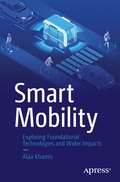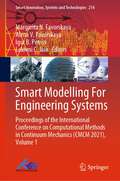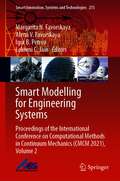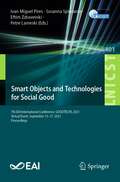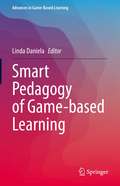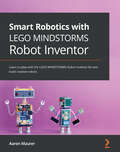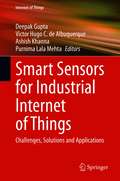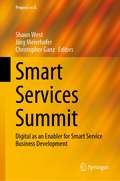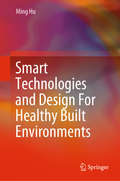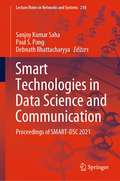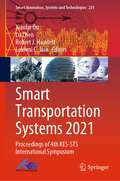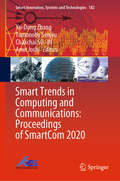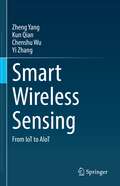- Table View
- List View
Smart Design, Science & Technology: Proceedings of the IEEE 6th International Conference on Applied System Innovation (ICASI 2020), November 5-8, 2020, Taitung, Taiwan (Smart Science, Design & Technology)
by Artde Donald Kin-Tak LamSmart Design, Science & Technology represents the proceedings of the IEEE 6th International Conference on Applied System Innovation (ICASI 2020), which was held in Taitung, Taiwan November 5-8, 2020. The conference received more than 200 submitted papers from at least 11 different countries, whereby roughly one third of these papers was selected by the committees and invited to present at ICASI 2020. This book aims to provide an integrated communication platform for researchers from a wide range of disciplines including information technology, communication science, applied mathematics, computer science, advanced material science, and engineering. Only high quality papers were allowed to publish in the volume. Hopefully, interdisciplinary collaborations between science and engineering technologists in academia and industry will be enhanced via this unique international network.
Smart Device Recognition: Ubiquitous Electric Internet of Things
by Hui Liu Chengming Yu Haiping WuThe book is the first international reference on the field of smart device recognition and Ubiquitous Electric Internet of Things (UEIOT). It presents a range of state-of-the-art key methods and applications for smart device recognition. In future smart environments, obtaining energy consumption information for identifying every device is an effective approach to guarantee the energy efficiency of smart industrial systems. Such as, the Ubiquitous Electric Internet of Things (UEIOT) technology represents one of the most effective measures for electricity and energy management and has attracted considerable attention from scientists and engineers around the world. The realization of smart device recognition in the UEIOT framework has become the core and basis of UEIOT’s success. The device smart recognition can help governments and managers to distribute energy and power better, and help device manufacturers to improve their products regarding smart energy conservation. Accordingly, in the future smart industry, implementing smart device recognition is desired and very important. In the book, several methods, strategies, and experiments for achieving smart device recognition are presented in details. As the first monograph in the field of smart device recognition, the book can provide beneficial reference for students, engineers, scientists, and managers in the fields of power, energy, electromechanical devices, smart cities, artificial intelligence, etc.
Smart Education and e-Learning 2021 (Smart Innovation, Systems and Technologies #240)
by Lakhmi C. Jain Robert J. Howlett Vladimir L. UskovThis book contains the contributions presented at the 8th International KES Conference on Smart Education and e-Learning (KES SEEL 2021), which being held as a virtual conference on June 14–16, 2021. It contains high-quality peer-reviewed papers that are grouped into several interconnected parts: smart education; smart e-learning; smart education: systems and technology; smart education: case studies and research; digital education and economics in smart university, smart university development: organizational, managerial and social Issues; smart universities and their Impact on students with disabilities. This book serves as a useful source of research data and valuable information on current research projects, best practices, and case studies for faculty, scholars, Ph.D. students, administrators, and practitioners— all those who are interested in smart education and smart e-learning.
Smart Global Megacities: Collaborative Research: Chennai, Kochi-Kannur (Advances in 21st Century Human Settlements)
by T. M. Vinod KumarThis book, the second volume, highlights 7 out of a total of about 36 megacities in the World which by definition have 10 million inhabitants. The cities/chapters presented in this book are based on recent advance such as the wide use of ICT, IOT, e-Governance, e-Democracy, smart economy and flattening and acceleration of the world that is taking place in recent times as reported by 3 times Pulitzer Prize Winner Thomas Friedman. It therefor departs from other ideologies where only a certain megacity qualifies for the title of smart global megacities while in reality every megacity can, and presents how smart global megacities can be created.
Smart Grid and Innovative Frontiers in Telecommunications: 5th EAI International Conference, SmartGIFT 2020, Chicago, USA, December 12, 2020, Proceedings (Lecture Notes of the Institute for Computer Sciences, Social Informatics and Telecommunications Engineering #373)
by Yuan Hong Peng Yu Maggie Cheng Huibin JiaThis book constitutes the refereed proceedings of the 5th International Conference on Smart Grid and Innovative Frontiers in Telecommunications, SmartGIFT 2020, held in Chicago, USA, in December 2020. Due to COVID-19 pandemic, the conference was held virtually.The 13 full papers were selected from 28 submissions and focus on the development of digital technology and smart grid which enables the smooth integration of centralised or distributed power generation, energy storage, and distribution. The papers are grouped thematically into: Communications, Networks and Services; Security and Stable Control; Internet of Power Things and Big Data.
Smart Grid and Internet of Things: 4th EAI International Conference, SGIoT 2020, TaiChung, Taiwan, December 5–6, 2020, Proceedings (Lecture Notes of the Institute for Computer Sciences, Social Informatics and Telecommunications Engineering #354)
by Der-Jiunn Deng Yi-Bing LinThis volume, SGIoT 2020, constitutes the refereed proceedings of the 4th EAI International Conference on Smart Grid and Internet of Things, SGIoT 2020, held in TaiChung, Taiwan, in December 2020.The IoT-driven smart grid is currently a hot area of research boosted by the global need to improve electricity access, economic growth of emerging countries, and the worldwide power plant capacity additions. The 40 papers presented were reviewed and selected from 159 submissions and present broad range of topics in wireless sensor, vehicular ad hoc networks, security, blockchain, and deep learning.
Smart Healthcare System Design: Security and Privacy Aspects (Advances in Learning Analytics for Intelligent Cloud-IoT Systems)
by Sk Hafizul Islam Debabrata SamantaThe purpose of this book is to help achieve a better integration between the work of researchers and practitioners in a single medium for capturing state-of-the-art IoT solutions in healthcare applications to address how to improve the proficiency of wireless sensor networks (WSNs) in healthcare. It explores possible automated solutions in everyday life, including the structures of healthcare systems built to handle large amounts of data, thereby improving clinical decisions; which is why this book will prove invaluable to professionals who want to increase their understanding of recent challenges in the IoT-enabled healthcare domain. The 14 chapters address various aspects of the IoT system, such as design challenges, theory, various protocols, and implementation issues, and also include several case studies. Smart Healthcare System: Security and Privacy Aspects covers the introduction, development, and applications of smart healthcare models that represent the current state-of-the-art of various domains. The primary focus will be on theory, algorithms, and their implementation targeted at real-world problems. It will deal with different applications to give the practitioner a flavor of how IoT architectures are designed and introduced into various situations. More particularly, this volume consists of 14 chapters contributed by authors well-versed in the subject who are devoted to reporting the latest findings on smart healthcare system design.
Smart Innovations in Communication and Computational Sciences: Proceedings of ICSICCS 2020 (Advances in Intelligent Systems and Computing #1168)
by Shailesh Tiwari Munesh C. Trivedi A. K. Misra Khedo Kavi Kumar Krishn Kumar Mishra Erma SuryaniThis book presents the latest advances and research findings in the fields of computational science and communication presented at the International Conference on Smart Innovations in Communications and Computational Sciences (ICSICCS 2020). The areas covered include smart innovation; systems and technologies; embedded knowledge and intelligence; innovation and sustainability; advanced computing; networking and informatics. It also focuses on the knowledge-transfer methodologies and the innovation strategies employed to make these effective. This fascinating compilation appeals to researchers, academics and engineers around the globe.
Smart Log Data Analytics: Techniques for Advanced Security Analysis
by Florian Skopik Markus Wurzenberger Max LandauerThis book provides insights into smart ways of computer log data analysis, with the goal of spotting adversarial actions. It is organized into 3 major parts with a total of 8 chapters that include a detailed view on existing solutions, as well as novel techniques that go far beyond state of the art. The first part of this book motivates the entire topic and highlights major challenges, trends and design criteria for log data analysis approaches, and further surveys and compares the state of the art. The second part of this book introduces concepts that apply character-based, rather than token-based, approaches and thus work on a more fine-grained level. Furthermore, these solutions were designed for “online use”, not only forensic analysis, but also process new log lines as they arrive in an efficient single pass manner. An advanced method for time series analysis aims at detecting changes in the overall behavior profile of an observed system and spotting trends and periodicities through log analysis. The third part of this book introduces the design of the AMiner, which is an advanced open source component for log data anomaly mining. The AMiner comes with several detectors to spot new events, new parameters, new correlations, new values and unknown value combinations and can run as stand-alone solution or as sensor with connection to a SIEM solution. More advanced detectors help to determines the characteristics of variable parts of log lines, specifically the properties of numerical and categorical fields.Detailed examples throughout this book allow the reader to better understand and apply the introduced techniques with open source software. Step-by-step instructions help to get familiar with the concepts and to better comprehend their inner mechanisms. A log test data set is available as free download and enables the reader to get the system up and running in no time.This book is designed for researchers working in the field of cyber security, and specifically system monitoring, anomaly detection and intrusion detection. The content of this book will be particularly useful for advanced-level students studying computer science, computer technology, and information systems. Forward-thinking practitioners, who would benefit from becoming familiar with the advanced anomaly detection methods, will also be interested in this book.
Smart Mobility: Exploring Foundational Technologies and Wider Impacts
by Alaa KhamisEach year we witness several paradigm shifts in mobility systems and services, increasingly so as technology progresses. The future of mobility is people-centric, software-defined, connected, and electric. Now more than ever, it is imperative for current and aspiring leaders in the field to understand the foundations of people-centric smart cities with a focus on sustainability. Smart Mobility offers a holistic view of the current and emerging smart mobility systems and explores their foundational technologies, technology enablers, and disruptors. Author Alaa Khamis acknowledges the need for smart mobility arising with growing world urbanization, and the impact of this on public health, congestion, and climate change. Khamis expertly interrogates how a focus on smart mobility can mitigate all of these risks using his triad of complementary factors: technology, governance, and city planning. In this book you’ll study how foundational technologies such as artificial intelligence, blockchain, the Internet of Things, robotics, and many more all work together to allow for smart mobility in our modern era. Khamis additionally covers the topical events of the COVID-19 pandemic and analyzes its impact on consumer behavior and the expected short-term disruptions and longer-term structural changes. The socioeconomic changes in our urban centers are vast, and Smart Mobility breaks down the core concepts with meaningful data and insights.What You Will LearnExplore different mobility modes, including mobility-as-a-service, shared mobility, mobility on demand, the gig economy and the passenger economyCover how the smart mobility triad - technology, governance, and city planning - work together to create a smart and sustainable mobilitySee how the COVID-19 pandemic is impacting consumer behavior and preferences and changing the future of mobilityWho This Book Is ForWorking professionals, students, researchers, technologists, city planners, and the curious layman.
Smart Modelling For Engineering Systems: Proceedings of the International Conference on Computational Methods in Continuum Mechanics (CMCM 2021), Volume 1 (Smart Innovation, Systems and Technologies #214)
by Lakhmi C. Jain Margarita N. Favorskaya Alena V. Favorskaya Igor B. PetrovThis book is a collection of research papers selected for presentation at the International Conference on Smart Computational Methods in Continuum Mechanics 2021, organized by Moscow Institute of Physics and Technology and the Institute for Computer Aided Design of Russian Academy of Sciences. The work is presented in two volumes. The primary objective of the book is to report the state-of-the-art on smart computational paradigms in continuum mechanics and explore the use of artificial intelligence paradigms such as neural nets, and machine learning for improving the performance of the designed engineering systems. The book includes up-to-date smart computational methods which are used to solve problems in continuum mechanics, engineering, seismic prospecting, non-destructive testing, and so on. The main features of the book are the research papers on the application of novel smart methods including neural nets and machine learning, computational algorithms, smart software systems, and high-performance computer systems for solving complex engineering problems. The case studies pertaining to the real-world applications in the above fields are included. The book presents a collection of best research papers in English language from some of the world leaders in the field of smart system modelling and design of engineering systems.
Smart Modelling for Engineering Systems: Proceedings of the International Conference on Computational Methods in Continuum Mechanics (CMCM 2021), Volume 2 (Smart Innovation, Systems and Technologies #215)
by Lakhmi C. Jain Margarita N. Favorskaya Alena V. Favorskaya Igor B. PetrovThis book is a collection of research papers selected for presentation at the International Conference on Smart Computational Methods in Continuum Mechanics 2021, organized by Moscow Institute of Physics and Technology and the Institute for Computer Aided Design of Russian Academy of Sciences. The work is presented in two volumes. The primary objective of the book is to report the state-of-the-art on smart computational paradigms in continuum mechanics and explore the use of artificial intelligence paradigms such as neural nets and machine learning for improving the performance of the designed engineering systems. The book includes up-to-date smart computational methods which are used to solve problems in continuum mechanics, engineering, seismic prospecting, non-destructive testing, and so on. The main features of the book are the research papers on the application of novel smart methods including neural nets and machine learning, computational algorithms, smart software systems, and high-performance computer systems for solving complex engineering problems. The case studies pertaining to the real-world applications in the above fields are included. The book presents a collection of best research papers in English language from some of the world leaders in the field of smart system modelling and design of engineering systems.
Smart Objects and Technologies for Social Good: 7th EAI International Conference, GOODTECHS 2021, Virtual Event, September 15–17, 2021, Proceedings (Lecture Notes of the Institute for Computer Sciences, Social Informatics and Telecommunications Engineering #401)
by Ivan Miguel Pires Susanna Spinsante Eftim Zdravevski Petre LameskiThis book constitutes the refereed post-conference proceedings of the 7th EAI International Conference on Smart Objects and Technologies for social Good, GOODTECHS 2021, held in September 2021. Due to COVID-19 pandemic the conference was held virtually. The 24 full papers presented were selected from 53 submissions and issue design, implementation, deployment, operation, and evaluation of smart objects and technologies for social good. Social goods are products and services provided through private enterprises, government, or non-profit institutions and are related to healthcare, safety, sports, environment, democracy, computer science, and human rights. The papers are arranged in tracks on machine learning; IoT; social considerations of technology; technology and ageing; healthcare.
Smart Pedagogy of Game-based Learning (Advances in Game-Based Learning)
by Linda DanielaThis book addresses the role of appropriate, specialized, structured pedagogy for game-based learning. It is an important reference for researchers who have carried out studies in the field of game-based learning with a focus on the digital learning environment. The educational landscape has dramatically changed in times of global pandemic urging us to search for new solutions, new educational pathways, and new agents for knowledge development. There is a need to support learning by using digital learning materials during remote learning or distance learning, where pedagogically structured game-based learning elements can play a role in motivating students to achieve.Utilizing game-based learning in education is not new, but this book adds substantially to the research base of the topic. The book reveals many new concepts, such as, balancing games and learning, supporting knowledge development, supporting the development of motivation, supporting balanced cognitive load in an effort to avoid ineffective forms of game-based learning
Smart Robotics with LEGO MINDSTORMS Robot Inventor: Learn to play with the LEGO MINDSTORMS Robot Inventor kit and build creative robots
by Aaron MaurerDiscover how to use the LEGO MINDSTORMS Inventor kit and boost your confidence in roboticsKey FeaturesGain confidence in building robots using creative designsLearn advanced robotic features and find out how to integrate them to build a robotWork with the block coding language used in robotics software in a practical wayBook DescriptionLEGO MINDSTORMS Robot Inventor is the latest addition to the LEGO MINDSTORMS theme. It features unique designs that you can use to build robots, and also enable you to perform activities using the robot inventor application. You'll begin by exploring the history of LEGO MINDSTORMS, and then delve into various elements of the Inventor kit. Moving on, you'll start working on different projects which will prepare you to build a variety of smart robots. The first robotic project involves designing a claw to grab objects, and helps you to explore how a smart robot is used in everyday life and in industry. The second project revolves around building a working guitar that can be played and modified to meet the needs of the user. As you advance, you'll explore the concept of biomimicry as you discover how to build a scorpion robot. In addition to this, you'll also work on a classic robotic challenge by building a sumobot. Throughout the book, you'll come across a variety of projects that will provide you with hands-on experience in building creative robots, such as building a Dragster, Egg Decorator, and Plankton from Spongebob Squarepants. By the end of this LEGO book, you'll have got to grips with the concepts behind building a robot, and also found creative ways to integrate them using the application based on your creative insights and ideas.What you will learnDiscover how the Robot Inventor kit works, and explore its parts and the elements inside themDelve into the block coding language used to build robotsFind out how to create interactive robots with the help of sensorsUnderstand the importance of real-world robots in today's landscapeRecognize different ways to build new ideas based on existing solutionsDesign basic to advanced level robots using the Robot Inventor kitWho this book is forThis book is for robot enthusiasts, LEGO lovers, hobbyists, educators, students, and anyone looking to learn about the new LEGO Robot Inventor kit. This book is designed to go beyond the basic build through to intermediate and advanced builds, and enables you to add your personal flair to the builds and codes.
Smart Sensors for Industrial Internet of Things: Challenges, Solutions and Applications (Internet of Things)
by Deepak Gupta Ashish Khanna Victor Hugo C. de Albuquerque Purnima Lala MehtaThis book brings together the latest research in smart sensors technology and exposes the reader to myriad industrial applications that this technology has enabled. The book emphasizes several topics in the area of smart sensors in industrial real-world applications. The contributions in this book give a broader view on the usage of smart sensor devices covering a wide range of interdisciplinary areas like Intelligent Transport Systems, Healthcare, Agriculture, Drone communications and Security.By presenting an insight into Smart Sensors for Industrial IoT, this book directs the readers to explore the utility and advancement in smart sensors and their applications into numerous research fields. Lastly, the book aims to reach through a mass number of industry experts, researchers, scientists, engineers, and practitioners and help them guide and evolve to advance research practices.
Smart Services Summit: Digital as an Enabler for Smart Service Business Development (Progress in IS)
by Shaun West Jürg Meierhofer Christopher GanzThis book offers state-of-the-art descriptions of intelligent service innovations in industry, supported by novel scientific approaches. It gathers findings presented at the 3rd Intelligent Services Summit, which took place in Zurich in September 2020, and chiefly focused on the design and application of Digital Twin as an enabler for business development in the field of smart services.Divided into three parts, the book addresses the challenges involved in the successful development and implementation of smart services for industry and science, ranging from data management to product design and lifecycle management. The four main aspects covered are industrial challenges, value system design (how to integrate resources into service ecosystems to create value), value creation through value proposition (how to create value for ecosystem actors), and value capture (how to create value for ecosystem businesses). Given its scope, the book offers an essential guide for practitioners and advanced students alike.
Smart Systems for E-Health: WBAN Technologies, Security and Applications (Advanced Information and Knowledge Processing)
by Hanen Idoudi Thierry ValThe purpose of this book is to review the recent advances in E-health technologies and applications. In particular, the book investigates the recent advancements in physical design of medical devices, signal processing and emergent wireless technologies for E-health. In a second part, novel security and privacy solutions for IoT-based E-health applications are presented. The last part of the book is focused on applications, data mining and data analytics for E-health using artificial intelligence and cloud infrastructure. E-health has been an evolving concept since its inception, due to the numerous technologies that can be adapted to offer new innovative and efficient E-health applications. Recently, with the tremendous advancement of wireless technologies, sensors and wearable devices and software technologies, new opportunities have arisen and transformed the E-health field. Moreover, with the expansion of the Internet of Things, and the huge amount of data that connected E-health devices and applications are generating, it is also mandatory to address new challenges related to the data management, applications management and their security. Through this book, readers will be introduced to all these concepts. This book is intended for all practitioners (industrial and academic) interested in widening their knowledge in wireless communications and embedded technologies applied to E-health, cloud computing, artificial intelligence and big data for E-health applications and security issues in E-health.
Smart Technologies and Design For Healthy Built Environments (Springerbriefs In Applied Sciences And Technology Ser.)
by Ming HuSmart Technologies and Design for Healthy Built Environment connects smart technology to a healthy built environmentthat builds upon the sustainable building movement.It provides an overall summary of the state-of-the-art technologies that are applied in the built environment. The book covers a broad spectrum of smart technology categories ranging from dynamic operability, energy efficiency, self-regulating and self-learning systems, and responsive systems. The foreseeable challenges that are associated with smart technologies are discussed and outlined in the book. Firstly, this book provides a snapshot of state-of-the-art smart technologies being applied in the built environment. It covers a broad spectrum of smart technology categories, ranging from dynamic operability, energy efficiency, self-regulating and self-learning systems, to responsive systems. Secondly, this book provides in-depth analysis of the four primary components of health (biological, physical, physiological and psychological); their effects on wellbeing and cognitive performance are introduced as well. Thirdly, it connects smart technologies to those health-influencing factors by reviewing three completed smart building projects. This book can also serve as a basis for education and discussion among professionals and students of diverse backgrounds who are interested in smart technologies, smart building, and healthy building. Smart Technologies and Design for Healthy Built Environment serves as the basis for education and discussions among professionals and students who are interested in smart technologies, smart building and healthy building, as it bridges the gap between smart technologies and a healthy built environment. The book also provides a foundation for anyone who is interested in the impact of smart technology on the health of built environment.
Smart Technologies for Precision Assembly: 9th IFIP WG 5.5 International Precision Assembly Seminar, IPAS 2020, Virtual Event, December 14–15, 2020, Revised Selected Papers (IFIP Advances in Information and Communication Technology #620)
by Svetan RatchevThis open access book constitutes the refereed post-conference proceedings of the 9th IFIP WG 5.5 International Precision Assembly Seminar, IPAS 2020, held virtually in December 2020.The 16 revised full papers and 10 revised short papers presented together with 1 keynote paper were carefully reviewed and selected from numerous submissions. The papers address topics such as assembly design and planning; assembly operations; assembly cells and systems; human centred assembly; and assistance methods in assembly.
Smart Technologies in Data Science and Communication: Proceedings of SMART-DSC 2021 (Lecture Notes in Networks and Systems #210)
by Debnath Bhattacharyya Sanjoy Kumar Saha Paul S. PangThis book features high-quality, peer-reviewed research papers presented at the Fourth International Conference on Smart Technologies in Data Science and Communication (SMART-DSC 2021), held in Koneru Lakshmaiah Education Foundation, Guntur, Andhra Pradesh, India, on 18–19 February 2021. It includes innovative and novel contributions in the areas of data analytics, communication, and soft computing.
Smart Transportation Systems 2021: Proceedings of 4th KES-STS International Symposium (Smart Innovation, Systems and Technologies #231)
by Lakhmi C. Jain Robert J. Howlett Xiaobo Qu Lu ZhenThis book gathers selected papers presented at the KES International Symposium on Smart Transportation Systems (KES-STS 2021). Modern transportation systems have undergone a rapid transformation in recent years, producing a range of technological innovations such as connected vehicles, self-driving cars, electric vehicles, Hyperloop, and even flying cars, and with them, fundamental changes in transport systems around the world. The book discusses current challenges, innovations, and breakthroughs in smart transportation systems, as well as transport infrastructure modelling, safety analysis, freeway operations, intersection analysis, and other related cutting-edge topics.
Smart Trends in Computing and Communications: Proceedings of SmartCom 2020 (Smart Innovation, Systems and Technologies #182)
by Amit Joshi Yu-Dong Zhang Tomonoby Senjyu Chakchai So–inThis book gathers high-quality papers presented at the International Conference on Smart Trends for Information Technology and Computer Communications (SmartCom 2020), organized by the Global Knowledge Research Foundation (GR Foundation) from 23 to 24 January 2020. It covers the state-of-the-art and emerging topics in information, computer communications, and effective strategies for their use in engineering and managerial applications. It also explores and discusses the latest technological advances in, and future directions for, information and knowledge computing and its applications.
Smart Wireless Sensing: From IoT to AIoT
by Zheng Yang Yi Zhang Chenshu Wu Kun QianPerception of human beings has evolved from natural biosensor to powerful sensors and sensor networks. In sensor networks, trillions of devices are interconnected and sense a broad spectrum of contexts for human beings, laying the foundation of Internet of Things (IoT). However, sensor technologies have several limitations relating to deployment cost and usability, which render them unacceptable for practical use. Consequently, the pursuit of convenience in human perception necessitates a wireless, sensorless and contactless sensing paradigm.Recent decades have witnessed rapid developments in wireless sensing technologies, in which sensors detect wireless signals (such as acoustic, light, and radio frequency) originally designed for data transmission or lighting. By analyzing the signal measurements on the receiver end, channel characteristics can be obtained to convey the sensing results. Currently, significant effort is being devoted to employing the ambient Wi-Fi, RFID, Bluetooth, ZigBee, and television signals for smart wireless sensing, eliminating the need for dedicated sensors and promoting the prospect of the Artificial Intelligence of Things (AIoT). This book provides a comprehensive and in-depth discussion of wireless sensing technologies. Specifically, with a particular focus on Wi-Fi-based sensing for understanding human behavior, it adopts a top-down approach to introduce three key topics: human detection, localization, and activity recognition. Presenting the latest advances in smart wireless sensing based on an extensive review of state-of-the-art research, it promotes the further development of this area and also contributes to interdisciplinary research.
Smart and Sustainable Agriculture: First International Conference, SSA 2021, Virtual Event, June 21-22, 2021, Proceedings (Communications in Computer and Information Science #1470)
by Selma Boumerdassi Éric Renault Mounir GhoghoThis book constitutes the refereed proceedings of the First International Conference on Smart and Sustainable Agriculture, SSA 2021, held as a virtual event in June 2021. The 12 papers presented were thoroughly reviewed and selected from the 25 qualified submissions. The papers provide discussion on new trends in communication and networking, Internet of Things, data processing for smart agriculture, renewable-energy based devices, low-cost solutions for wide-area exploitations and developing countries, smart agriculture and urban farming, smart irrigation, application to small-size andlarge-size exploitations, application of ancestral farming to smart agriculture, waste management for agriculture 2.0, and census of regional ancestral farming.
